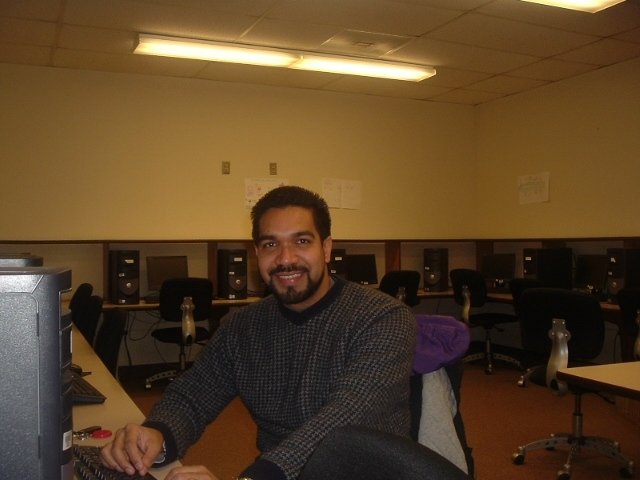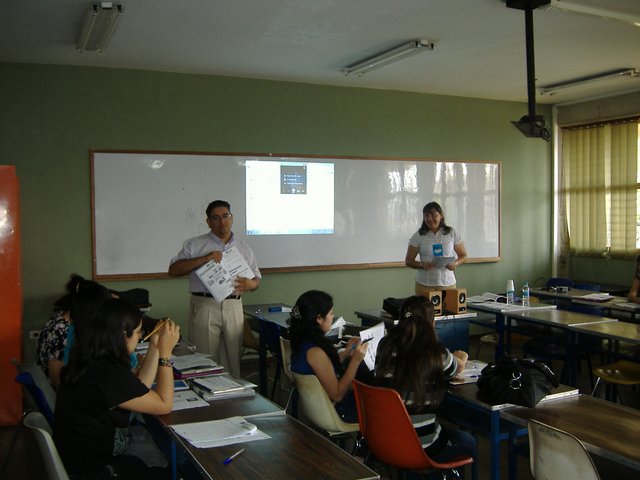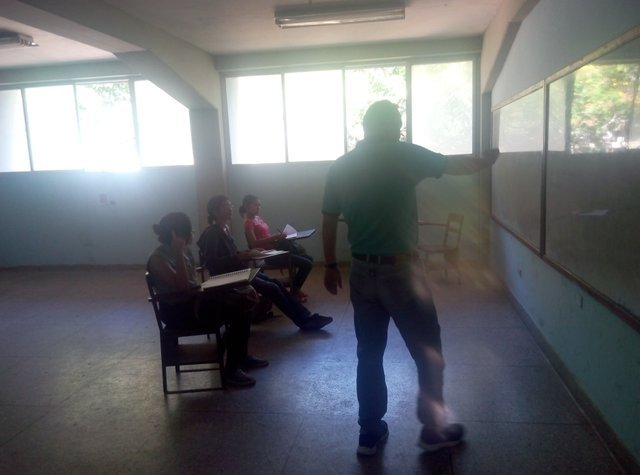ADSactly Life : Teaching with Your Fingernails
Teaching EFL with Your Fingernails
Greetings, everyone
I will start a series of posts on one aspect of my professional career I rarely post about: Teaching EFL/ESL (English as a Foreign Language/English as a Second Language).

Classroom at Illinois State University
Even though it can be argued that in order for any language to be learned you only need one avid learner, didactic resources play an important role in the teaching of the four basic skills any language course involves, namely: listening, speaking, reading, and writing (most likely developed in that order).
One of the reasons I quit my teaching possition at the Universidad de Oriente was because, as the Spanish expression goes, we were teaching with our fingernails. The idiomatic expression (a fascinating area I hope to post more about) stands for an activity that is performed under very difficult circumstances and with limited resources.Trabajar con las uñas (teaching with our fingernails) means to work without the minimum required tools. As any artisan would attest, this does not mean you cannot have the job done, but chances are the result will not be as good as desired or expected.
Over the decades, theoreticians and pedagogues have joined forces to put together a series of principles under which effective and efficient teaching-learning experiences can be carried out.
All these principles are condensed in textbooks that suggest certain approaches, methods, and techniques and which can be used and adapted by skillful teachers to meet the needs of their particular students and make the best of whatever resources are available.

Sample of some of the textbooks I used over the years.
The textbook, along with their accompanying materials (audios, videos, apps) find their best realization in a conducive environment, which in the past was predominantly a classroom, but that now can take different forms or formats. Learning to speak a language requires a lot of practice and interaction with fellow learners or with native speakers. The time it takes an average learner to acquire enough of the target language to satisfy their needs may depend on this exposure.

Presentation of a textbook at a symposium in UNET (Universidad Nacional Experimental del Táchira)
Modern teaching tools include online courses and smartphone apps that have infused TESOL (Teaching English to Speakers of Other Languages) with a lot of vitality and versatility. Even though the role of the textbook, the classroom, and the teacher seem to be minimized or even totally cancelled in some cases, human interaction and the modeling and guidance of human instructors are still a key aspect of the learning process.
One teaching tool may substitute another or deem it useless, but usually, when it comes to language learning, all learning materials can complement each other and because people have different learning styles (multiple intelligences?), there is not one single right way to teach and/or learn.
One thing is true, though. Learning a language, like learning any other skill, requires hard work, dispossition, (human and material) resources, interaction, and a favorable environment. The efficiency of the process and the quality of the result will repend on the combination of these factors. Teaching and learning con las uñas should not be an option.

Classroom at Universidad De Oriente
written by @hlezama
Click the coin below to join our Discord Server
)
Buenísimo, yo me estoy planteando hacer un trabajo en telecomunicaciones contándole mi experiencia en el área, seguiré tus publicaciones excelente idea. Hay que adaptarse a las tecnologías con las redes para la enseñanza online
Excelente. Sería muy interesante ver ese trabajo. Una de las cosas que nos mata en Venezuela es la imposibilidad de actualizarnos respecto a las nuevas tecnologías, tendencias, o simplemente las nuevas publicaciones. Que un profesor universitario no pueda ni siquiera comprar nuevs libros en su área ha sido unos de los crímenes imperdonables de este gobierno (considerando que en la calidad de la formación profesional recae buena parte del peso de la calidad de la educación en general).
Cierto
I'm glad you're part of the team of writers on @A DSactly's blog, @hlezama. Your knowledge and experience, I'm sure, will give us significant insights.
As for the general question of teaching-learning, I agree with you that it is a process that must be fulfilled with the best conditions. The development of a modern society depends on education.
With regard to the teaching of one language and more than one second language, it is indispensable today more than ever to have the technical resources and support, in a world that is in continuous movement and increasingly widespread (the "global village" of McLuhan).
Finally, it is very regrettable that you have had to cut your university teaching career because of the terrible conditions in every sense that the current regime in Venezuela has brought the educational system (particularly the university level).
Thank you for your interesting post, @hlezama. We are reading each other.
Thank you, @josemalavem. I remember when I started college in 1991 we had a university library where we could find any book by any of the major publishing houses. We had faculty members from England, the USA, France, and many other countries. Even by 1997, the year I graduated, we had a language lab that was the same model of the one I saw in Ohio University. Every year 2 of our best students were selected to travel abroad in exchange for two students from England or the USA. We were actively being part of that global village.
There were plans for improvement; there was a vision of what we could become in 5 or 10 years. That stop by 2000 and nose-dived by 2008. From that point on we were doomed to disappear as a competitive university.
Education is key for the development of any country and the teaching of languages are an integral part of that development.
We have some 25 years of backwardness to recover from if we want to be back in the educational game/business.
It's so good to see you around here with an extremely interesting subject. As a teacher in a country going through a terrible economic moment, I had to manage to achieve my academic goals and I juggled as if I were in a circus. I respect the reasons why people can stop teaching in Venezuela, especially if the personal situation is as unbearable as a thousand kilo stone. He who is made to teach does so even with his eyes, and you, my very dear friend, @hlezama, teach with your word. I'm glad you're on the @adsactly team. Welcome and hugs ;)
Thanks, @nancibriti. My gratitude to the @adsactly team, especially to @princessmewmew, for the suppport and the opportunity they have given me.
I did my best to teach with all the resources I could put together. I tried to provide my students with as many tools as possible so that they could be the best (some of them have thanked me for that), but in a system that promotes conformism, mediocrity, and corruption it is hard to keep one's integrity. Sooner or later we sucumb to the forces that press us against the wall.
In the particular case of teaching English, we started to renounce to most of what makes learning a second language an exciting experience. Our language lab was looted, so our students did not have the chance to practice listening and pronunciation skills; our library became obsolete, as we stopped receiving books and were unable to buy them from our pockets; cultural interchange with English-speaking countries were cancelled when it became too dangerous for other countries to send their students to Venezuela; our student became unable to afford even a photocopy of any teaching material and eventually drop out rates were so high we did not even have students to teach. Thus, the whole crisis ruined a vital part of the educational system, which is to provide students with skills in other languages which may give them the upper hand in the job market.
It's very nice to see you writing for @adsactly!
I like the photo of the old teaching materials, and it reminds me of the differences between what materials were used to teach me (Run Jane run!) and those my children used. Both methods and collections of materials worked, but you've made me wonder if having to gather materials over the years from a bunch of modalities might not be BETTER than each student having the exact same modern textbook. As you say about different learning styles, a book that works for one student might not work for another.
Hi, @owasco. Thanks for stopping by. It is complicated, especially in formal settings (schools, universities).
I always told those students who struggled with the language that the formal setting did not work in their benefit (because the institution tries to standardize teaching and learning). Usually, when those students who were underperforming enrolled in some private course or took a summer trip to, say, Trinidad (the closest English-speaking destination--we are talking about the old good days when a student could afford a three months stay at Trinidad) they learned more and faster. They'd come back to the university program more confident and ready to advance in their degrees.
Some institutions can be very strict in their approach and here's where the role of the instructor is so important: to find alternative methods, materials or techniques to address every student's learning skills and particular situations. A student with a speech impediment, for instance, may fail a phonetic/pronuntiation test in a university or academy, but that does not mean they cannot communicate effectively. That same student/learner can succeed in a different setting.
Hi, @adsactly!
You just got a 0.33% upvote from SteemPlus!
To get higher upvotes, earn more SteemPlus Points (SPP). On your Steemit wallet, check your SPP balance and click on "How to earn SPP?" to find out all the ways to earn.
If you're not using SteemPlus yet, please check our last posts in here to see the many ways in which SteemPlus can improve your Steem experience on Steemit and Busy.